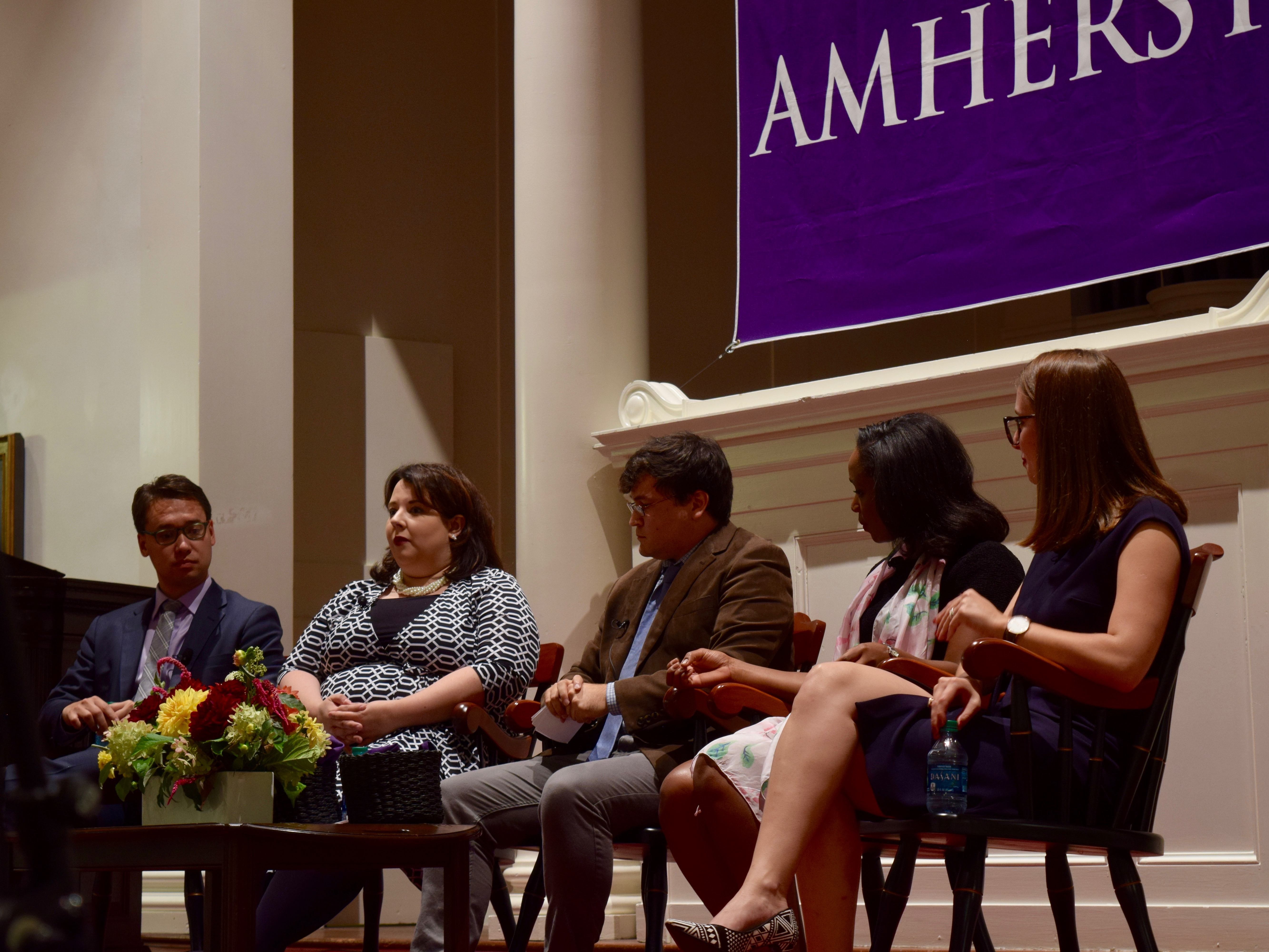

Five political journalists covering this year’s presidential campaigns participated in a panel discussion titled “Tales from the Trail” on Oct. 6. The discussion, which was open to the public and held in Johnson Chapel, featured Julia Ioffe from Politico, Abby Phillip from The Washington Post, Jessica Taylor from NPR and Byron Tau from The Wall Street Journal and was moderated by Tim Murphy from Mother Jones.
President Biddy Martin opened the night by introducing Murphy, who introduced each of the four other participants.
Electoral politics were the first topic of discussion, as Murphy began the talk by asking the other journalists if this year was the “craziest election in our time” and why this election seems so different from previous years’.
Phillip and Taylor addressed the long-term changes in the American electorate following widespread demographic change, the recession and a political shift from President Obama’s eight-year presidency.
“Here in this country, there is an inexorable movement toward diversity and change that’s leaving a lot of people in this country in the lurch,” Phillip said, adding that it was “a long time coming.”
Tau said that the contentious Republican campaign revealed “rising tides of populism” and deep divisions within the party, and that the party’s elite have “almost no control” over who their nominee will be. Ioffe compared the rise of Donald Trump, the contentious Republican nominee, with worldwide events such as the election of controversial Philippines president Rodrigo Duterte, “Brexit” and the growth of the far right in Germany.
Taylor added that Trump differed from most other politicians in that his campaign largely lacked internal structure and that he frequently abandoned script during major appearances or rallies.
“It’s essentially a toss-up,” Murphy said, referring to both major candidates’ odds of winning the election. “Why is it so close? What are we missing?”
Despite running a campaign with minimal structure, Trump seemed to win the primaries and gain more support from the electorate because of his rejection of traditional political norms, according to Ioffe.
“In some ways, TV and Twitter are his campaign apparatus,” she said, likening his campaign strategy to “Dada performance art” that made unwitting participants of the electorate, drawing laughs from the audience.
Ioffe also added that while she was “baffled” about the closeness of the race, she was not surprised that someone was taking advantage of the country’s fears and divisions in this election.
Taylor, Ioffe and Phillip also commented on Democratic nominee Hillary Clinton’s performance this election season. Taylor noted the puzzling dip in Clinton’s favorability ratings from their height, shortly after she left her position as secretary of state, to how low they are now. According to Ioffe, sexism plays a large part in the inexplicable “visceral hatred” of Clinton and the widespread view of her as untrustworthy, despite Trump’s own record of dishonest statements.
“It could also be that campaigning is an inauthentic exercise,” Phillip said. “To be a good politician, you have to be good at faking authenticity, and [Clinton] is not good at that.”
Murphy then turned the focus of the discussion to the media and the role it has played during this election season. “Is the media responsible for Trump?” he asked.
Trump has “hacked the political media,” said Tau. The Republican nominee was “genuinely vibrant and entertaining, for better or worse” and accessible to the press and made many “provocative and outrageous” newsworthy statements. Only nine percent of the electorate voted in the primary elections, so it was “relatively easy for [Trump] to hijack a small portion of the voting public,” Tau said.
“I think the media has gotten more aggressive, at least in terms of telling its readers, ‘no, this is what happened, and these are the set of facts,’” Tau added.
Ioffe said that Trump understands the media and knows how to use it to his advantage, and that campaign journalists experience “existential angst” over how to cover Trump’s campaign. “It’s a cheap and easy answer to blame us,” said Ioffe, pointing to other changes in the Republican Party and the U.S. that led to Trump’s rise.
Ioffe and Taylor also addressed the disparity in viewpoints between different media outlets and said that many people are consuming exclusively liberal- or conservative-leaning news, which affects their perceptions of the media as a whole.
The discussion later turned to the role that social media plays in controlling the news to which people are exposed.
The panelists also addressed questions from audience members, which covered topics such as flaws in the electoral process, the media’s role in the Democratic primaries’ outcomes and presidential debate moderators’ role in holding candidates accountable for major inaccuracies.
“I was expecting the discussion to be more anecdotal,” Liam Fine ’17, who helped organize the event, said in an email interview. “However, I found the confluence of political analysis, stories from the campaigns and personal opinions to be particularly captivating and effective.”
Some students had also been selected to attend two classes held by the panelists earlier that afternoon. In the classes, the journalists talked more about their campaign trail experiences and journalism as a profession.